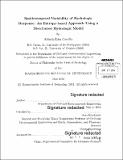| dc.contributor.advisor | Dara Entekhabi. | en_US |
| dc.contributor.author | Castillo, Aldrich Edra | en_US |
| dc.contributor.other | Massachusetts Institute of Technology. Department of Civil and Environmental Engineering. | en_US |
| dc.date.accessioned | 2014-09-19T21:36:05Z | |
| dc.date.available | 2014-09-19T21:36:05Z | |
| dc.date.copyright | 2014 | en_US |
| dc.date.issued | 2014 | en_US |
| dc.identifier.uri | http://hdl.handle.net/1721.1/90040 | |
| dc.description | Thesis: Ph. D. in Hydrology, Massachusetts Institute of Technology, Department of Civil and Environmental Engineering, 2014. | en_US |
| dc.description | Cataloged from PDF version of thesis. | en_US |
| dc.description | Includes bibliographical references (pages 179-189). | en_US |
| dc.description.abstract | Basin hydrologic response pertains to the partitioning of precipitation into stream-flow, evapotranspiration, and change in storage. The ability to explain or predict the response has many applications e.g. flood forecasting, water budget studies, and design of hydrological observing systems. However, explaining the response is challenging because it is the combined manifestation of many complex and interrelated factors that naturally vary in space and time, and act over a variety of scales. A possible key is better understanding of the space-time dynamics of the hydrologic state variable - the soil moisture field. This thesis uses the distributed hydrologic model MOBIDIC that uses a single soil layer with dual compartments: a capillary and a gravity reservoir composed of small, and large pores, respectively. Mass and energy fluxes are simultaneously solved using simple linear equations. These make the model computationally efficient. To improve soil moisture simulations, some model modifications were introduced. MOBIDICs ability to simulate the magnitude range and dynamics of soil moisture at the local scale is found comparable with a benchmark model that uses non-linear soil physics relations. We derive an entropy-based dimensionless measure of hydrologic complexity H which measures the distance of a given soil moisture spatial probability distribution from two limiting cases. Using 8 test basins with area of 10⁰-10³ km² and representing semiarid, temperate, and humid climates, it is shown that H effectively tracks the evolution of soil moisture distribution, and captures the interplay between vertical and lateral fluxes. Furthermore, we investigate the relationship of W with observable basin attributes and traditional measures of hydrologic response. Clear and logical relationships emerge only after grouping basins based on similarity. For example, in the semiarid basins, H increases with catchment area, infiltration ratio and baseflow index. For basins of similar size, H is highest in temperate climate, consistent with soil moisture being double-bounded so its variability peaks at intermediate conditions. Finally, although not explicitly coded in MOBIDIC, hysteresis is evident in the discharge-storage plots. It emerges from the use of a dual-pore soil structure that captures the threshold behavior of runoff. R- helps in understanding the mechanisms involved. | en_US |
| dc.description.statementofresponsibility | by Aldrich Edra Castillo. | en_US |
| dc.format.extent | 189 pages | en_US |
| dc.language.iso | eng | en_US |
| dc.publisher | Massachusetts Institute of Technology | en_US |
| dc.rights | M.I.T. theses are protected by copyright. They may be viewed from this source for any purpose, but reproduction or distribution in any format is prohibited without written permission. See provided URL for inquiries about permission. | en_US |
| dc.rights.uri | http://dspace.mit.edu/handle/1721.1/7582 | en_US |
| dc.subject | Civil and Environmental Engineering. | en_US |
| dc.title | Spatiotemporal variability of hydrologic response : an entropy-based approach using a distributed hydrologic model | en_US |
| dc.type | Thesis | en_US |
| dc.description.degree | Ph. D. in Hydrology | en_US |
| dc.contributor.department | Massachusetts Institute of Technology. Department of Civil and Environmental Engineering | |
| dc.identifier.oclc | 890139354 | en_US |
